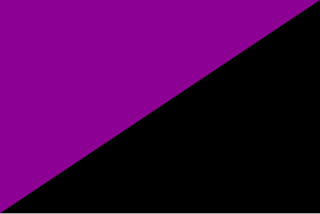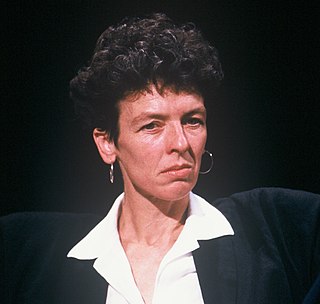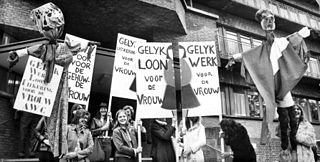Related Research Articles

Left-wing politics support social equality and egalitarianism, often in opposition of social hierarchy. Left-wing politics typically involve a concern for those in society whom its adherents perceive as disadvantaged relative to others as well as a belief that there are unjustified inequalities that need to be reduced or abolished. According to emeritus professor of economics Barry Clark, left-wing supporters "claim that human development flourishes when individuals engage in cooperative, mutually respectful relations that can thrive only when excessive differences in status, power, and wealth are eliminated."

Anarcha-feminism, also referred to as anarchist feminism, is a system of analysis which combines the principles and power analysis of anarchist theory with feminism. Anarcha-feminism closely resembles intersectional feminism. Anarcha-feminism generally posits that patriarchy and traditional gender roles as manifestations of involuntary coercive hierarchy should be replaced by decentralized free association. Anarcha-feminists believe that the struggle against patriarchy is an essential part of class conflict and the anarchist struggle against the state and capitalism. In essence, the philosophy sees anarchist struggle as a necessary component of feminist struggle and vice versa. L. Susan Brown claims that "as anarchism is a political philosophy that opposes all relationships of power, it is inherently feminist".

Estelle Sylvia Pankhurst was an English campaigner for the suffrage and suffragette movement, a socialist and later a prominent left communist and activist in the cause of anti-fascism and the international auxiliary language movement. She spent much of her later life campaigning on behalf of Ethiopia, where she eventually settled.
Identity politics is a political approach wherein people of a particular gender, religion, race, social background, social class, environmental, or other identifying factors, develop political agendas that are based upon these identities. Such groups often have support from allies outside the respective identity groups. The term is used in a variety of ways to describe phenomena as diverse as multiculturalism, women's movements, civil rights, lesbian and gay movements, and regional separatist movements.
Socialist feminism rose in the 1960s and 1970s as an offshoot of the feminist movement and New Left that focuses upon the interconnectivity of the patriarchy and capitalism. However, the ways in which women's private, domestic, and public roles in society has been conceptualized, or thought about, can be traced back to Mary Wollstonecraft's A Vindication of the Rights of Woman (1792) and William Thompson's utopian socialist work in the 1800s. Ideas about overcoming the patriarchy by coming together in female groups to talk about personal problems stem from Carol Hanisch. This was done in an essay in 1969 which latter coined the term 'the personal is political.' This was also the time that second wave feminism started to surface which is really when socialist feminism kicked off. Socialist feminists argue that liberation can only be achieved by working to end both the economic and cultural sources of women's oppression. Socialist feminism is a two-pronged theory that broadens Marxist feminism's argument for the role of capitalism in the oppression of women and radical feminism's theory of the role of gender and the patriarchy. Socialist feminists reject radical feminism's main claim that patriarchy is the only, or primary, source of oppression of women. Rather, Socialist feminists assert that women are oppressed due to their financial dependence on males. Women are subjects to male domination within capitalism due to an uneven balance in wealth. They see economic dependence as the driving force of women's subjugation to men. Further, Socialist feminists see women's liberation as a necessary part of larger quest for social, economic, and political justice. Socialist feminists attempted to integrate the fight for women's liberation with the struggle against other oppressive systems based on race, class, sexual orientation, or economic status.
The women's liberation movement (WLM) was a political alignment of women and feminist intellectualism that emerged in the late 1960s and continued into the 1980s primarily in the industrialized nations of the Western world, which effected great change throughout the world. The WLM branch of radical feminism, based in contemporary philosophy, comprised women of racially- and culturally-diverse backgrounds who proposed that economic, psychological, and social freedom were necessary for women to progress from being second-class citizens in their societies.
The connection between left-leaning ideologies and LGBT rights struggles has a long and mixed history. Prominent socialists who were involved in early struggles for LGBT rights include Edward Carpenter, Oscar Wilde, Harry Hay, Bayard Rustin, Emma Goldman and Daniel Guérin, among others.
Black feminism is a philosophy that centers on the idea that "Black women are inherently valuable, that [Black women's] liberation is a necessity not as an adjunct to somebody else's but because our need as human persons for autonomy."

Spare Rib was a second-wave feminist magazine in the United Kingdom that emerged from the counter culture of the late 1960s as a consequence of meetings involving, among others, Rosie Boycott and Marsha Rowe. Spare Rib is now recognised as an iconic magazine, which shaped debate about feminism in the UK, and as such it was digitised by the British Library in 2015. The magazine contained new writing and creative contributions which challenged stereotypes and supported collective solutions. It was published between 1972 and 1993. The title derives from the Biblical reference to Eve, the first woman, created from Adam's rib.

Mary Lorimer Beatrix Campbell, OBE is an English writer and activist who has written for a number of publications since the early 1970s. Her books include Wigan Pier Revisited (1984), Goliath: Britain's Dangerous Places (1993) and Diana, Princess of Wales: How Sexual Politics Shook the Monarchy (1998). She has also made films, including Listen to the Children (1990), a documentary about child abuse.
The Combahee River Collective was a Black feminist lesbian socialist organization active in Boston from 1974 to 1980. The Collective argued that both the white feminist movement and the Civil Rights Movement were not addressing their particular needs as Black women and, more specifically, as Black lesbians. Racism was present in the mainstream feminist movement, while Delaney and Manditch-Prottas argue that much of the Civil Rights Movement had a sexist and homophobic reputation. The Collective are perhaps best known for developing the Combahee River Collective Statement, a key document in the history of contemporary Black feminism and the development of the concepts of identity politics as used among political organizers and social theorists, and for introducing the concept of interlocking systems of oppression, a key concept of intersectionality. Gerald Izenberg credits the 1977 Combahee statement with the first usage of the phrase "identity politics". Through writing their statement, the CRC connected themselves to the activist tradition of Black women in the 19th Century and to the struggles of Black liberation in the 1960s.

The Communist Party of Great Britain (CPGB) was the largest communist party in Great Britain from 1920 to 1991. Founded in 1920 through a merger of several smaller Marxist parties, the CPGB gained the support of many socialist organisations and trade unions following the political fallout of the First World War and the Russian October Revolution. Ideologically the CPGB was a socialist party organised upon Marxism–Leninist ideology, strongly opposed to British colonialism, sexual discrimination, and racial segregation. These beliefs led many leading anti-colonial revolutionaries, feminists, and anti-fascist figures, to become closely associated with the party. Many prominent CPGB members became leaders of Britain's trade union movements, including Jessie Eden, Abraham Lazarus, Ken Gill, Clem Beckett, GCT Giles, Mike Hicks, and Thora Silverthorne.

Far-left politics in the United Kingdom have existed since at least the 1840s, with the formation of various organisations following ideologies such as Marxism, revolutionary socialism, communism, anarchism and syndicalism.
The women's liberation movement in Oceania was a feminist movement that started in the late 1960s and continued through the early 1980s. Influenced by the movement which sought to make personal issues political and bring discussion of sexism into the political discourse in the United States and elsewhere, women in Australia and New Zealand began forming WLM groups in 1969 and 1970. Few organisations formed in the Pacific Islands, but both Fiji and Guam had women affiliated with the movement.

The women's liberation movement in Europe was a radical feminist movement that started in the late 1960s and continued through the 1970s and in some cases into the early 1980s. Inspired by developments in North America and triggered by the growing presence of women in the labour market, the movement soon gained momentum in Britain and the Scandinavian countries. In addition to improvements in working conditions and equal pay, liberationists fought for complete autonomy for women's bodies including their right to make their own decisions regarding contraception and abortion, and more independence in sexuality.
The women's liberation movement in Asia was a feminist movement that started in the late 1960s and through the 1970s. Women's liberation movements in Asia sought to redefine women's relationships to the family and the way that women expressed their sexuality. Women's liberation in Asia also dealt with particular challenges that made the liberation movement unique in different countries.
Red Star was a communist publication created by the Red Women's Detachment, consisting of six issues released between March 1970 and October 1971. Articles in Red Star advocate for communist revolution to bring about women's liberation and focus on themes of violent revolution, welfare, and birth control. The Red Women's Detachment differs from traditional women's groups in its working class demographics and its revolutionary ideals, and is critical of the Women's Liberation Movement.
Women's Report was a second wave, feminist, bi-monthly newspaper published in the UK from 1972-1979 with international subscribers. In the spirit of the women’s consciousness-raising groups of the 1960’s and 70’s, Women’s Report was put together by a small, democratic group of unpaid women without lead editor, editorial assistant, regular columnists, feature writers, hierarchy, commercial advertising, background capital or party-political affiliation. Non-profit and self-financing, it set out to relay information and report news and events not covered in the UK national press; to comment on reported events which were of relevance to women; and, by collecting the news and information into a single publication to give them more impact and heighten women’s awareness of their position in society. Women's Report was part of the array of crucial communication tools, used by feminists, that underpinned the Women’s Liberation Movement.
References
- 1 2 3 Geoff Andrews (2004). Endgames and New Times: The Final Years of British Communism, 1964-1991. Lawrence & Wishart. pp. 66–. ISBN 978-0-85315-991-9.
- 1 2 3 Darlington, Joseph (8 June 2017). Red Rag: A Magazine's Journey from Communism to Civil Society. Wars of position. Manchester.
- ↑ Laurel Forster (2009). "Printing liberation: the women's movement and magazines in the 1970s". In Laurel Forster; Sue Harper (eds.). British Culture and Society in the 1970s: The Lost Decade. Cambridge Scholars Publishing. p. 97. ISBN 978-1-4438-1838-4.
- ↑ David Bouchier (1984). The Feminist Challenge: The Movement for Women's Liberation in Britain and the USA . Schocken Books. p. 101. ISBN 978-0-8052-3881-5.
- ↑ Anna Marie Smith (2012). Laclau and Mouffe: The Radical Democratic Imaginary. Routledge. p. 37. ISBN 978-1-134-85564-3.